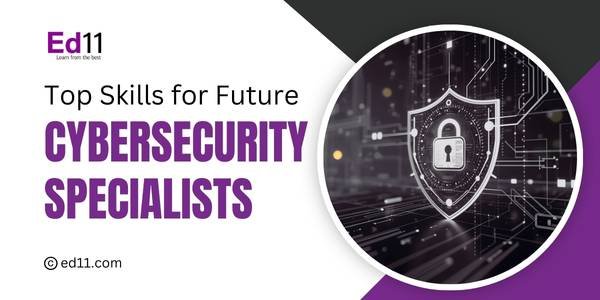Top Skills for Future Cybersecurity Specialists
Discover the top skills future cybersecurity specialists need, including threat detection, network security, ethical hacking, and cloud protection.

Discover top skills for future cybersecurity specialists, including threat detection, ethical hacking, risk management, and advanced security tools. I’m a Senior Cybersecurity Specialist, and over the 4 years, I’ve learned what it takes to excel in this exciting field. As cyber threats continue to evolve, the demand for skilled cybersecurity specialists is growing quickly. But to stay ahead, you’ll need a mix of technical know-how, problem-solving ability, and adaptability. Let me walk you through the top skills that can help you thrive in this role and secure a successful future.
What is Cybersecurity Specialists
Cybersecurity specialists protect computer systems, networks, and data from cyber threats. They detect, prevent, and respond to attacks. With advancements like Artificial Intelligence, they use smarter tools to identify risks faster and secure sensitive information. Their role is crucial in keeping organizations safe online.
Benefits of Future Cybersecurity Specialists
-
High Job Demand: With increasing cyber threats, companies will always need experts to protect their systems and data.
-
Excellent Salary Potential: Cybersecurity specialists are among the highest-paid professionals due to their critical role in business safety.
-
Wide Range of Opportunities: They can work in banking, tech, government, healthcare, and more, making the career path flexible.
-
Protecting Sensitive Data: Cybersecurity experts help prevent data breaches, ensuring customer and company information stays safe.
-
Continuous Learning: With evolving technologies and threats, specialists keep learning new techniques, making the work dynamic and exciting.
-
Making a Global Impact: Their role affects national security and business integrity, creating a safer digital world for everyone.
Top Skills for Future Cybersecurity Specialists
Network Security Skills
Cybersecurity specialists play a key role in safeguarding networks, requiring strong knowledge of network protocols and potential attack points. They need to identify security gaps, set up protective measures, and monitor for breaches effectively. Learning programming languages like Python is essential, as it helps automate tasks, develop security tools, and analyze data quickly. Specialists often use Python to write scripts for scanning vulnerabilities and detecting anomalies. Tools like Wireshark and Snort enhance network monitoring, while understanding firewalls and VPN configurations ensures protection of sensitive data. Cybersecurity specialists must stay ahead by continuously learning and adapting to emerging threats.
Why It Matters: If you can’t protect a network, you can’t protect the organization. Networks are a common entry point for cyberattacks, so this skill is a must.
Knowledge of Operating Systems
Cybersecurity specialists must be skilled in managing security across different operating systems, such as Windows, Linux, and macOS. Each system presents unique challenges and vulnerabilities that require careful monitoring and defense strategies. Linux, commonly used in servers, demands expertise in file permissions, system logs, and firewalls to safeguard critical data. Windows, being a core system in most organizations, requires strong knowledge of network security, user authentication, and patch management. Cybersecurity specialists must also understand macOS, especially in enterprises with mixed environments. Their ability to secure diverse systems is essential to protect against cyberattacks and ensure robust organizational security.
Tip: Learn how to perform basic system hardening this means reducing vulnerabilities by disabling unused features, applying updates, and using secure configurations.
Understanding of Cyber Threats and Vulnerabilities
A key part of being cybersecurity specialists is understanding the various threats they may encounter. Common threats include phishing attacks, malware, ransomware, and insider threats. Specialists must stay updated on evolving cyber risks and develop strong defense mechanisms. Tools like firewalls, intrusion detection systems, and encryption play a vital role in safeguarding sensitive data. Knowledge of MySQL is essential when protecting databases, as vulnerabilities in SQL queries can lead to cyberattacks like SQL injection. By monitoring database security and applying patches, specialists help prevent breaches. Strong communication skills also allow them to educate teams about security best practices. A proactive approach ensures safer systems and networks.
-
Malware (viruses, ransomware)
-
Phishing attacks
-
Denial-of-Service (DoS) attacks
-
SQL injection
You’ll need to understand how these attacks work, how hackers exploit vulnerabilities, and how to protect systems from them. Staying updated with the latest trends in cybersecurity is important because new threats are constantly emerging.
Tools to Explore: Metasploit (for penetration testing) and Nessus (for vulnerability scanning).
Incident Detection and Response
Cybersecurity specialists play a vital role in protecting sensitive systems by acting quickly when a threat is detected. Even with advanced defenses, cyberattacks can bypass security measures, so detecting issues early is key. Specialists monitor network traffic, analyze system alerts, and spot abnormal behavior. Collaboration with IT teams ensures swift containment of the threat and reduces downtime. Creating and testing incident response plans help prepare for unexpected attacks. Specialists often investigate breaches to understand vulnerabilities and prevent future risks. Regular system updates and security audits are part of their proactive defense. By staying ahead of threats, cybersecurity specialists safeguard both business operations and customer trust.
Key Steps in Incident Response
-
Detect the incident
-
Contain the threat
-
Eradicate the attacker’s access
-
Recover systems and data
-
Analyze and improve defenses to prevent future attacks
Knowledge of Encryption and Cryptography
Cybersecurity specialists rely on encryption as a core defense against cyber threats. By encrypting sensitive data, they ensure that only authorized users can access important files and communications. Understanding encryption algorithms such as AES (Advanced Encryption Standard) and RSA allows them to safeguard critical information from hackers. Public Key Infrastructure (PKI) plays a crucial role in this process by managing digital certificates, which are used to authenticate users and devices online. Cybersecurity specialists also monitor encrypted networks for vulnerabilities and implement advanced security protocols. Their knowledge of cryptographic methods helps prevent data breaches and secure confidential transactions in today’s digital world.
Real-Life Example: If a company’s sensitive email communications aren’t encrypted, hackers could intercept them, exposing confidential information.
Programming and Scripting Skills
While cybersecurity specialists don’t need to be expert coders, learning basic programming languages like Java can be highly beneficial. Java helps in writing scripts for security tools, automating repetitive tasks, and creating security applications. With coding knowledge, specialists can analyze malware, identify vulnerabilities, and develop solutions to mitigate attacks. Understanding how attackers exploit software weaknesses improves threat detection and prevention. Many security tasks, like penetration testing and vulnerability assessments, often involve code review. Cybersecurity specialists with Java skills are better equipped to debug systems and fix security loopholes. This combination of coding and security expertise opens doors to advanced roles in the field.
Common programming languages for cybersecurity specialists include
-
Python: For automation, scripting, and creating security tools
-
Bash: For writing Linux shell scripts
-
SQL: For identifying vulnerabilities in databases
Tip: Start small and learn how to write scripts to automate repetitive tasks, like monitoring network traffic or scanning for open ports.
Risk Assessment and Management
Cybersecurity specialists do more than just fix technical issues they identify, assess, and prioritize risks to protect valuable data. They evaluate potential vulnerabilities and develop security measures to prevent cyberattacks. By staying updated on the latest threats, they ensure that organizations remain one step ahead of hackers. Communication is key, as cybersecurity specialists must explain risks to non-technical management, helping them allocate resources effectively. Collaboration with teams across departments is common, making their role central to business safety. Specialists also perform regular audits and testing to detect weaknesses early. Their work ensures business continuity and builds trust with customers.
Key Concepts to Learn
-
Threat modeling: Identifying and evaluating potential threats
-
Vulnerability assessments: Identifying weak points in systems
-
Risk mitigation: Implementing controls to reduce risk
Security Compliance and Regulations
Many industries, such as finance, healthcare, and government, have strict regulations to safeguard sensitive data. Cybersecurity specialists must understand key compliance requirements like GDPR, HIPAA, and PCI-DSS to ensure organizations meet legal standards. Their role involves implementing security measures, monitoring data access, and preventing unauthorized breaches. Being aware of industry-specific policies is essential to avoid fines and protect company reputation. Cybersecurity specialists also work closely with legal and IT teams to ensure ongoing compliance as regulations evolve. Their expertise ensures that security frameworks align with both operational needs and legal guidelines, creating a safe digital environment.
-
GDPR (General Data Protection Regulation) for data privacy in Europe
-
HIPAA (Health Insurance Portability and Accountability Act) for healthcare data security
-
PCI-DSS (Payment Card Industry Data Security Standard) for handling credit card information
Tip: Stay updated with changing regulations, as non-compliance can be costly.
Penetration Testing and Ethical Hacking
Penetration testing is a critical skill for cybersecurity specialists, as it helps prevent real attacks by identifying security flaws early. By simulating cyberattacks, specialists can assess a system’s defenses and recommend improvements. Ethical hacking techniques, such as network scanning and exploiting vulnerabilities, are key tools in this process. Organizations rely on cybersecurity specialists to conduct these tests and safeguard sensitive data. Continuous testing ensures that defenses stay strong against evolving threats. With advanced training, specialists can detect even hidden vulnerabilities. This proactive approach minimizes risks and protects businesses from costly breaches.
Certifications to Consider
-
Certified Ethical Hacker (CEH)
-
Offensive Security Certified Professional (OSCP)
Soft Skills: Communication and Collaboration
Cybersecurity specialists do more than just protect networks; they bridge the gap between technical teams and business leaders. They simplify complex security issues so that everyone, from managers to employees, can take proper precautions. Collaboration is key, as they often work with IT, HR, and legal departments to implement security policies. Problem-solving skills help them detect and fix vulnerabilities before they escalate. As threats evolve, cybersecurity specialists must stay updated on the latest tools and techniques. By fostering teamwork and effective communication, they ensure that organizations stay one step ahead of cybercriminals.
Key Soft Skills
-
Teamwork: Collaborating with IT, legal, and management teams
-
Problem-solving: Quickly identifying and fixing security issues
-
Adaptability: Staying calm under pressure during incidents
Continuous Learning and Adaptability
Cybersecurity is constantly evolving, requiring cybersecurity specialists to stay updated with the latest threats and solutions. New malware, hacking techniques, and security vulnerabilities emerge frequently, making continuous learning essential. Specialists can attend industry conferences, enroll in online courses, or obtain certifications to sharpen their skills. Networking with other professionals helps exchange knowledge and stay informed. Hands-on practice through real-world projects is key to mastering defensive strategies. As technology advances, cybersecurity specialists who adapt and grow will remain valuable assets in protecting organizations from attacks.
-
Attending industry conferences
-
Following cybersecurity blogs and news sites
-
Earning certifications like CISSP, CompTIA Security+, and CISM
Cloud Security Knowledge
As more businesses adopt cloud-based services, cybersecurity specialists play a crucial role in protecting sensitive data. They need to understand cloud platforms such as (AWS) Amazon Web Services, Microsoft Azure, and Google Cloud to ensure secure data storage and management. Key skills include identifying vulnerabilities, setting up strong access controls, and encrypting data. Cybersecurity specialists must also be familiar with concepts like cloud compliance, threat detection, and response strategies. By safeguarding cloud environments, they help prevent data breaches and cyberattacks. Their expertise ensures that organizations can operate in the cloud confidently and securely.
-
Identity and Access Management (IAM)
-
Data encryption in the cloud
-
Cloud security policies
The role of cybersecurity specialists will only grow in importance as digital threats become more complex. By mastering these essential skills network security, cryptography, incident response, and more you’ll be well-equipped to protect organizations and advance your career in this dynamic field. Whether you’re just starting or looking to upskill, remember that persistence and continuous learning are key. As a senior cybersecurity specialist, I can confidently say that this field offers endless opportunities, and the demand for skilled professionals is higher than ever. So, take the first step today and secure your future in cybersecurity.



















